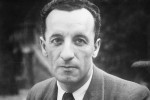Merleau-Ponty
Oct 13th, 2012 |
By Marc Applebaum

Philosopher Ludwig Landgrebe (1902-1991) was one of Husserl’s closest assistants. Landgrebe’s description of Husserl below was translated by Algis Mickunas, Professor Emeritus, Ohio University, and included by Lester Embree in his Representation of Edmund Husserl: “Almost everyone who first encountered Husserl experienced something of a disappointment at not immediately seeing any external signs of how
[continue reading…]
Posted in Merleau-Ponty |
Comments Off on What was it like to study with Husserl?
Tags: Husserl
Oct 12th, 2012 |
By Marc Applebaum

This conversation between philosopher Susi Ferrarello and me began, as is often the case in phenomenology, with an everyday experience: dreaming. My description of a dream led us to reflect on Merleau-Ponty’s discussions of dreaming and waking perception, and Husserl’s active and passive intentionality. The exchange continued over several weeks, and we’ve summarized it here–
[continue reading…]
Posted in Merleau-Ponty |
Comments Off on The Phenomenology of Dreaming: A Dialogue
Tags: Applebaum, embodiment, Ferrarello, Husserl, Merleau-Ponty
Sep 19th, 2012 |
By Marc Applebaum

Introduction Intersubjectivity can be described as a relationship between me and an other. The peculiarity of this relationship lies in the fact that the other is not alien to me, but is “within me” in a way that his or her “otherness” can be investigated beginning with the way in which that “otherness” is imminent
[continue reading…]
Posted in Merleau-Ponty |
Comments Off on Ferrarello: Husserl, Intersubjectivity, and Lifeworld
Tags: Ferrarello, Husserl, intersubjectivity, reduction
Sep 3rd, 2012 |
By Marc Applebaum

I recently posted a short discussion of what “the natural attitude” means in Husserl’s phenomenology. As I mentioned, the natural attitude is the perspective of everyday life. For Husserl the process he calls the phenomenological reduction is the means by which the phenomenologist frees himself from the reifications of the natural attitude, gaining a standpoint
[continue reading…]
Posted in Merleau-Ponty |
1 Comment »
Tags: Applebaum, epoche, Gurwitsch, Husserl, reduction
Aug 29th, 2012 |
By Marc Applebaum

This PowerPoint presentation was developed for the first meeting of a seminar introducing psychology students to phenomenological psychological research, and assumes no prior knowledge of Husserl or continental philosophy. The descriptive phenomenological research method itself is introduced in depth over the course of the semester–this presentation is a “first taste” of Husserlian terms for students. Naturally, I added
[continue reading…]
Posted in Merleau-Ponty |
Comments Off on Applebaum: Introducing Husserl’s phenomenology to psychology students
Tags: Applebaum, Husserl
Aug 18th, 2012 |
By Marc Applebaum

This is the first in a series of our posts on central ideas in phenomenology—please add your observations, additions, or questions in the comments section! I’ll begin with what Husserl calls “the natural attitude.” In everyday life we see the objects of our experience such as physical objects, other people, and even ideas, as simply
[continue reading…]
Posted in Merleau-Ponty |
Comments Off on Key Ideas in Phenomenology: Applebaum on the Natural Attitude
Tags: Applebaum, Husserl, Merleau-Ponty
Apr 23rd, 2012 |
By Marc Applebaum

Community: from the Latin communis, meaning common, public, general, shared by all or many. Phenomenological psychology as expressed by Maurice Merleau-Ponty is an exploration intended to illuminate the shared psychological meanings and structures that we live pre-reflectively in daily experience. He offers an elegant example at the beginning of the essay Science and the Experience
[continue reading…]
Posted in Merleau-Ponty |
Comments Off on Applebaum: Phenomenology, community, and intercultural dialogue
Tags: Applebaum, Husserl, intersubjectivity, Merleau-Ponty, postmodernism

 Follow
Follow email
email




